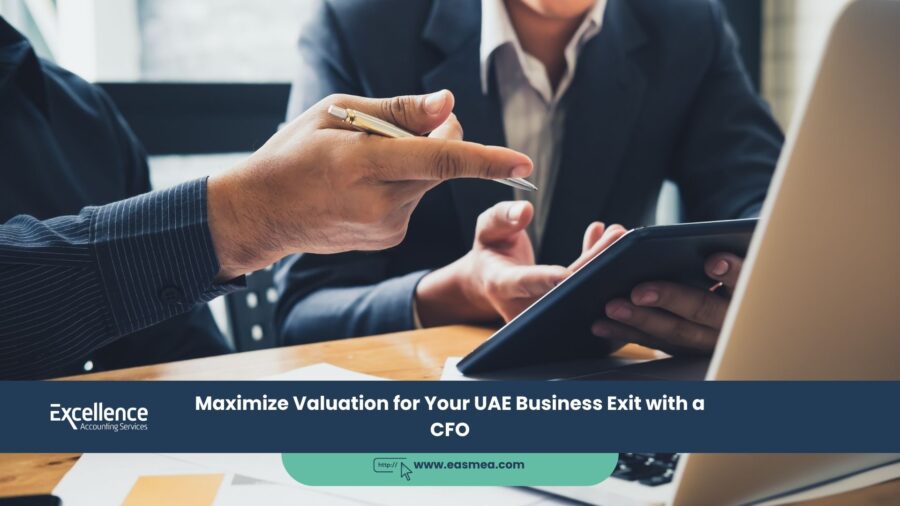The Exit Strategist: How a CFO Helps You Maximize Valuation for Your UAE Business Exit
For every entrepreneur, the business exit is the ultimate milestone—the culmination of years of relentless hard work, risk-taking, and sacrifice. Whether it’s a sale to a strategic acquirer, a private equity firm, or a management buyout, this single transaction determines the ultimate financial return on your life’s work. Yet, in the dynamic UAE market, a shocking number of business owners approach this critical moment unprepared, leaving millions of dirhams on the negotiation table. They fail to realize that the strategy to maximize valuation for your UAE business exit doesn’t begin when a buyer shows interest; it begins years earlier, orchestrated by a strategic financial leader.
- The Exit Strategist: How a CFO Helps You Maximize Valuation for Your UAE Business Exit
- The Mindset Shift: From Running a Business to Selling a Business
- The CFO's Pre-Exit Playbook: Building a Fortress of Value
- What Excellence Accounting Services (EAS) Can Offer: Your Partner to Maximize Valuation for Your UAE Business Exit
- Frequently Asked Questions (FAQs)
- Are You Planning Your Ultimate Payday?
This is the domain of the Chief Financial Officer (CFO). A strategic CFO, or an expert outsourced CFO service, is the architect of a successful exit. They transform the company’s financial function from a backward-looking scorekeeper into a forward-looking value creation engine. They meticulously prepare the business to be viewed through the critical lens of a buyer, ensuring its financial story is not just accurate, but compelling. This guide provides a detailed playbook on how a CFO’s expertise is the single most critical factor to maximize valuation for your UAE business exit and secure the legacy you deserve.
Key Takeaways
- Exit Planning is a Multi-Year Strategy: To truly maximize valuation for your UAE business exit, the preparation process should begin at least 2-3 years before you plan to sell.
- The CFO is the Exit Quarterback: A CFO leads the charge in preparing the company financially, crafting the growth narrative, and managing the intense scrutiny of the due diligence process.
- Clean Financials are Non-Negotiable: Buyers pay a premium for clarity and a discount for uncertainty. Immaculate, audited financials are the bedrock of a high valuation.
- Valuation is About the Future, Not the Past: A CFO builds a credible, data-driven financial model that tells a compelling story of future growth, which is what buyers are ultimately purchasing.
- Proactive Due Diligence Preparation: Building a “bulletproof” data room well in advance streamlines the sale process, builds buyer confidence, and prevents last-minute valuation erosion.
The Mindset Shift: From Running a Business to Selling a Business
The first, and most crucial, role of a CFO in an exit strategy is to shift the owner’s perspective. When you are running a business day-to-day, your focus is often on operational challenges, sales targets, and immediate cash flow. When you are preparing to sell a business, the focus must shift to how a potential buyer perceives value and risk.
A buyer is not just buying your past performance; they are buying a future stream of cash flows. They will scrutinize every aspect of your business to identify potential risks that could jeopardize those future earnings. A CFO helps you see your business through this external lens, identifying and mitigating weaknesses long before they can be used against you in a negotiation. This strategic foresight is the first step to maximize valuation for your UAE business exit.
The CFO’s Pre-Exit Playbook: Building a Fortress of Value
A high valuation is not a matter of luck; it is the result of a deliberate, multi-year strategy. A CFO orchestrates this process by focusing on several key value-driving initiatives.
1. The Financial Deep Clean & Normalization
This is the foundational step. A buyer expects to see pristine financial records. A CFO will lead a “deep clean” of the company’s books, which involves more than just basic accounting and bookkeeping. It includes:
- Securing Audited Financials: Obtaining 2-3 years of audited financial statements from a reputable firm provides immediate credibility.
- Calculating “Normalized” Earnings (Adjusted EBITDA): This is a critical process where the CFO adjusts the reported profit to reflect the true, ongoing earning power of the business. This means adding back non-recurring or discretionary expenses that a new owner would not incur, such as one-off legal fees, above-market owner salaries, or personal expenses run through the company. A higher adjusted EBITDA directly translates to a higher valuation.
- Cleaning up the Balance Sheet: Removing non-operating assets and settling outstanding shareholder loans creates a cleaner, more attractive financial picture.
2. Crafting the Compelling Growth Narrative
Buyers pay top dollar for growth. A CFO’s role is to take your business vision and translate it into a credible, defensible financial forecast. This isn’t just about creating a hopeful spreadsheet; it’s about building a sophisticated financial model that links your strategic initiatives (e.g., new market entry, new product launch) to revenue and profit projections. This data-driven story, often supported by a detailed feasibility study, is what convinces a buyer to pay a premium for your company’s future potential.
3. Optimizing Working Capital and Cash Flow
A business that generates cash efficiently is inherently more valuable. A CFO will implement strategies to optimize the cash conversion cycle:
- Accelerating Accounts Receivable: Implementing stricter credit policies and more efficient collection processes, supported by robust accounts receivable management.
- Managing Accounts Payable: Negotiating better payment terms with suppliers without damaging relationships, handled through disciplined accounts payable processes.
- Optimizing Inventory: Reducing excess or obsolete stock to free up cash that is tied up on shelves.
A lean, efficient working capital cycle demonstrates strong management and reduces the amount of cash a buyer needs to inject into the business post-acquisition, a key factor to maximize valuation for your UAE business exit.
4. De-Risking the Business
Every perceived risk in your business will translate into a discount on your valuation. A strategic CFO systematically identifies and mitigates these risks:
- Customer Concentration: Reducing reliance on a small number of large customers.
- Supplier Dependency: Securing alternative suppliers for critical components.
- Key Person Risk: Ensuring knowledge is documented and distributed, and that key employees have employment contracts.
- Compliance Gaps: Ensuring full compliance with UAE labor laws, VAT regulations, and Corporate Tax. A clean bill of health from tax advisors is crucial.
- Weak Internal Controls: Implementing and documenting financial controls to prevent fraud and error, often verified through an internal audit.
5. Building a Bulletproof Data Room for Due Diligence
Due diligence is the intense, microscopic examination of your business by the buyer. A poorly organized due diligence process can kill a deal or lead to last-minute price reductions. A CFO prepares for this proactively by creating a virtual “data room” months in advance. This is a secure online repository containing every document a buyer will want to see: financial statements, tax returns, customer contracts, supplier agreements, employee contracts, incorporation documents, and more. A well-organized data room, supported by a due diligence expert, signals professionalism and transparency, accelerating the deal and maintaining momentum.
You don’t get a second chance to make a first impression. A professionally prepared data room tells a buyer you are serious, organized, and have nothing to hide.
What Excellence Accounting Services (EAS) Can Offer: Your Partner to Maximize Valuation for Your UAE Business Exit
Preparing for a business exit is a complex and high-stakes process. At Excellence Accounting Services, we provide the strategic financial leadership to guide you every step of the way and ensure you maximize valuation for your UAE business exit.
- Exit Readiness & Strategy: Our Outsourced CFO Services work with you to develop a multi-year exit strategy, focusing on key value drivers.
- Professional Business Valuation: We provide a clear, defensible business valuation so you understand your company’s worth and can set realistic goals.
- Due Diligence Support: We help you prepare for the rigors of scrutiny with our expert due diligence support services, ensuring your data room is comprehensive and your responses are strategic.
- Financial Cleanup and Reporting: We get your books in pristine, “buyer-ready” condition with our core accounting and financial reporting services.
- Tax Structuring and Compliance: We ensure your tax affairs are in perfect order with our Corporate Tax and VAT advisory teams, a critical component of de-risking the business for a buyer.
Frequently Asked Questions (FAQs)
The ideal time to start planning is 2-3 years before you intend to sell. This provides sufficient time to implement value-enhancing strategies, clean up financials, secure audited statements for multiple years, and mitigate any identified risks. Starting early is the single best way to maximize valuation for your UAE business exit.
EBITDA stands for Earnings Before Interest, Taxes, Depreciation, and Amortization. It’s used as a proxy for a company’s operating cash flow and is the most common metric used in business valuations. A business is often valued using a “multiple” of its adjusted EBITDA (e.g., 5x EBITDA). Therefore, every extra dirham of adjusted EBITDA a CFO can justify can increase your final sale price by a factor of 5 or more.
A messy P&L, with personal expenses mixed in or inconsistent cost classifications, creates uncertainty. Buyers cannot clearly see the true profitability of the core business. This forces them to make conservative assumptions, and they will price that uncertainty into their offer, resulting in a lower valuation. A clean P&L provides clarity and confidence.
Enterprise Value is the value of the entire business, typically calculated as a multiple of EBITDA. Equity Value is the value that ultimately goes to the shareholders. It is calculated by taking the Enterprise Value, subtracting debt, and adding cash. A CFO works to maximize Enterprise Value while managing debt and cash to ensure the highest possible Equity Value for the owners.
While a CFO’s primary role is to prepare the company to be sold, they are a key part of the deal team. They work alongside M&A advisors and investment bankers whose job it is to find and negotiate with buyers. The CFO’s work in preparing a professional financial package makes the company far more attractive to the high-quality buyers these advisors bring to the table.
Yes, absolutely. This is a classic scenario where a CFO adds immense value. They will perform a deep-dive analysis to understand the reasons for low profitability—be it pricing strategy, cost structure, or operational inefficiencies. By developing and implementing a plan to improve margins in the 1-2 years leading up to a sale, they can dramatically increase the company’s EBITDA and, therefore, its exit valuation.
A QofE report is an in-depth analysis of a company’s historical earnings, prepared during the due diligence process. It validates the seller’s EBITDA adjustments and assesses the sustainability and accuracy of the reported earnings. A CFO will often commission a “sell-side” QofE report before going to market to identify and address any issues proactively, which strengthens the seller’s negotiating position.
This is known as customer concentration, and it is a significant risk that lowers valuation. A buyer will be concerned that if that one large customer leaves after the acquisition, the company’s revenue will plummet. A CFO will advise on a strategy to mitigate this risk over the 2-3 year exit planning period by actively diversifying the customer base.
Yes, this is a major red flag for a buyer. It represents “key person risk”—the danger that your most important employees could leave after the sale, taking their knowledge and customer relationships with them. A CFO would identify this as a critical issue and work with HR and legal counsel to put formal employment agreements and retention incentives in place before an exit.
Preparing a data room proactively does two things. First, the process itself forces you to get your entire business in order, often revealing issues that need to be fixed. Second, when a buyer expresses interest, you can grant them access immediately. This creates momentum, shows you are a serious and organized seller, and prevents you from having to scramble under pressure, which is when mistakes are made and value is lost.
Conclusion: Your Exit is Your Legacy—Secure It with a Strategist
Your business exit is more than a transaction; it is the financial realization of your entrepreneurial journey. To approach it without the best possible strategic guidance is to leave your legacy to chance. To maximize valuation for your UAE business exit, you need an architect, a strategist, and a defender. You need a CFO.
By investing in strategic financial leadership well before you plan to sell, you transform your company into a premium asset that commands the highest possible price. You replace uncertainty with clarity, risk with resilience, and hope with a data-driven strategy designed for one purpose: to deliver the maximum return for your life’s work.
Are You Planning Your Ultimate Payday?
Let Excellence Accounting Services be your strategic partner in preparing for the most important transaction of your business's life. Our exit readiness and CFO services are designed to help you achieve your maximum valuation.




